Return to mylesstandish.info
 xc
xc
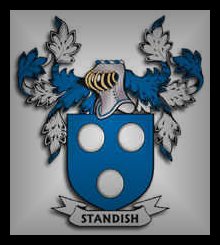
The Pele Tower of the Standish Family of Duxbury Lancashire was constructed in 1310 A.D. demolished c.1650 . Myles Standish was born in 1584 and if he was a descendant of Hugh Standish the founder of the Standish of Duxbury family the birth of Myles would have been at the Pele tower of Duxbury.

1310 A.D. - Document Lancashire
Archives 397/8/21.
The arrival in Duxbury of Hugh
Standish of the House of Standish of Standish. The document grants lands on the
Manor of Duxbury to Hugh Standish upon which he builds his Pele Tower.
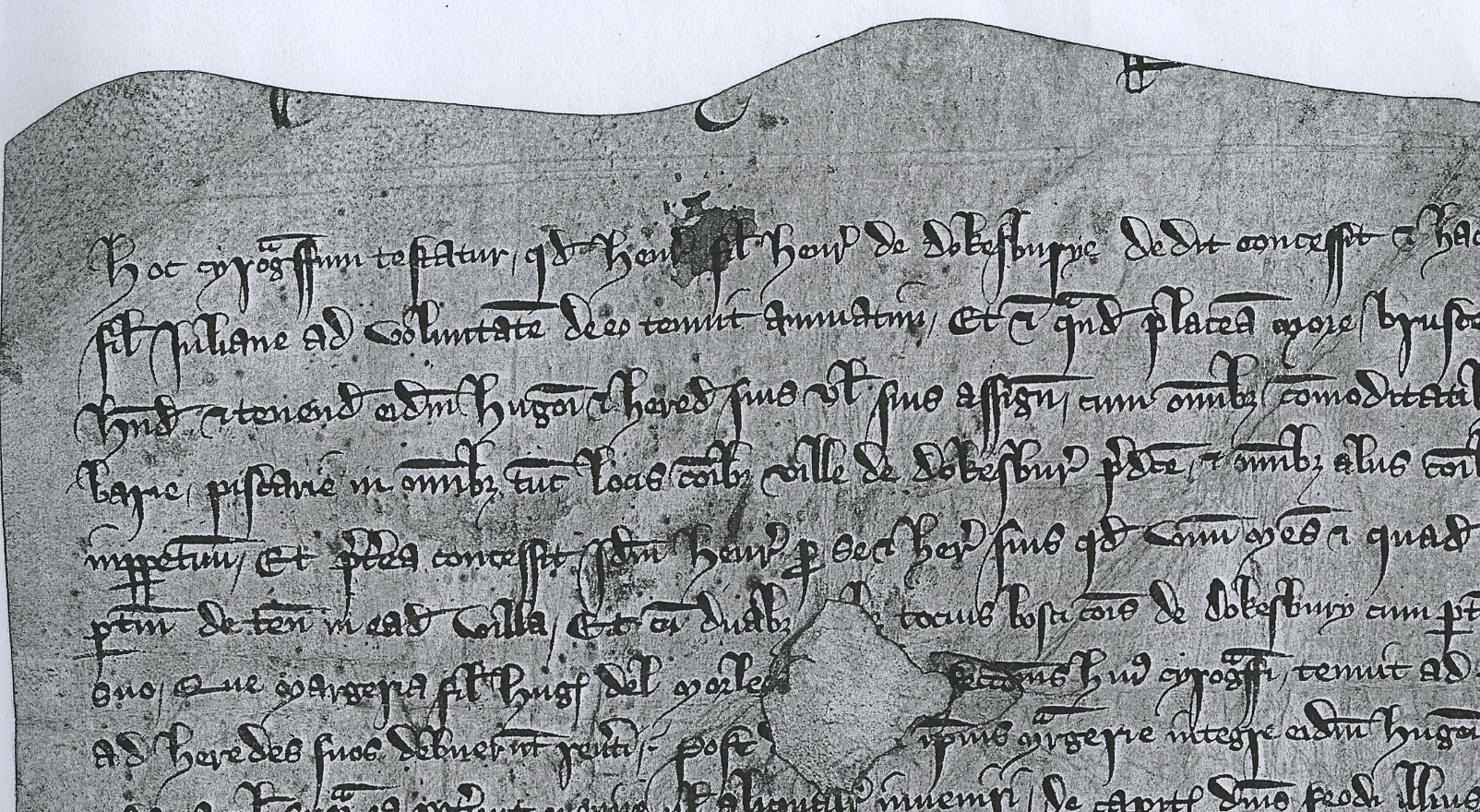

Year 1395 (19 Richard 11) Christopher de Standish Lord of the Manor of Duxbury changes the family coat of Arms.
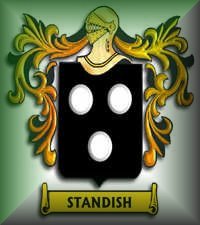 Arms changed from to -
Arms changed from to - 
The Standish family of Duxbury used the Arms of Standish of Standish until 1395 and then made a slight change to the background colour from Black to Blue. (used 1395 to 1812)

Year 1545. Deed signed by James Standish of the Pele, Lord of the Manor of Duxbury.
 DEED.jpg)
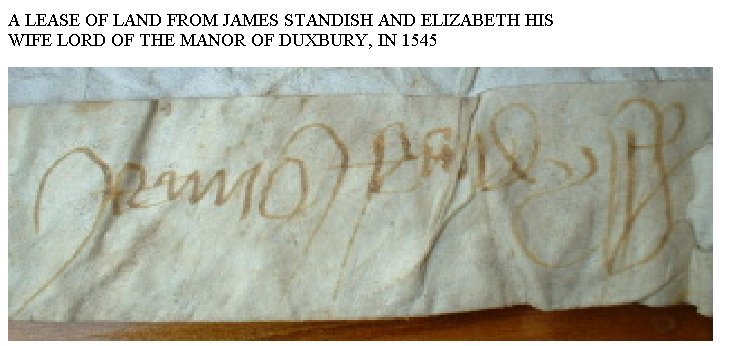

Standish of Duxbury or Standish of Standish ?
In his will of March 7 th 1655 Myles Standish states that he is descended from Standish of Standish.
Between the years 1533 - 1664 Visitations of Lancashire were made and the Standish family of Duxbury had to submit details of their lawful descent. In those Visitations the Standish family of Duxbury describe their descent as Standish of Standish in common with Myles Standish? In order to establish that the original Visitations held at the College of Arms in London confirm the words Standish of Standish for the descent of the Standish family of Duxbury a search was requested and undertaken by windsor Herald of Arms Mr. W. G. Hunt TD.BA.FCA. His search confirmed that the Standish Family of Duxbury did recorded their descent as Standish of Standish between 1533- 1664 in common with Myles Standish.
The visitaion below is certified as correct by the Windsor Herald of Arms and contains hid hand written notes upon it.
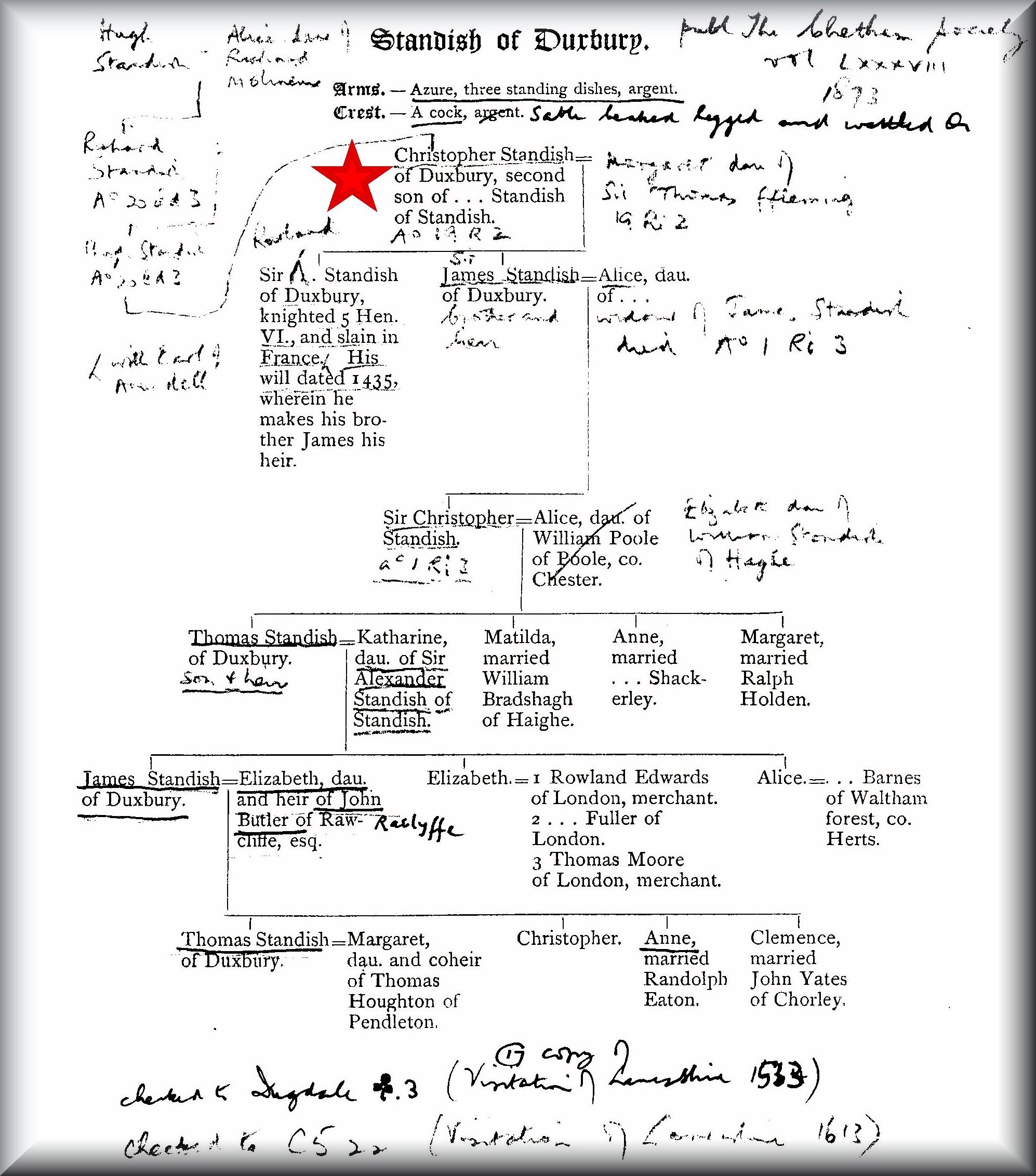

1631. The end of the Pele Tower.
4 th. day of August 1631
A.D. Document Lancashire Archives DP 502/6/3/3.
Thomas Standish Lord of the Manor of Duxbury writes to
Edward Lloyd of Wigan Lancashire his last letter addressed from the Pele Tower date 4th August 1631.The Standish family then moved into their new home Duxbury Hall. On Christmas
day 1631 in the New Hall of Duxbury Thomas and his surviving sons could not have
envisaged that the hand of fate in the form of the English Civil War would see
Thomas Standish and ALL his sons dead by the 15th day of June 1647.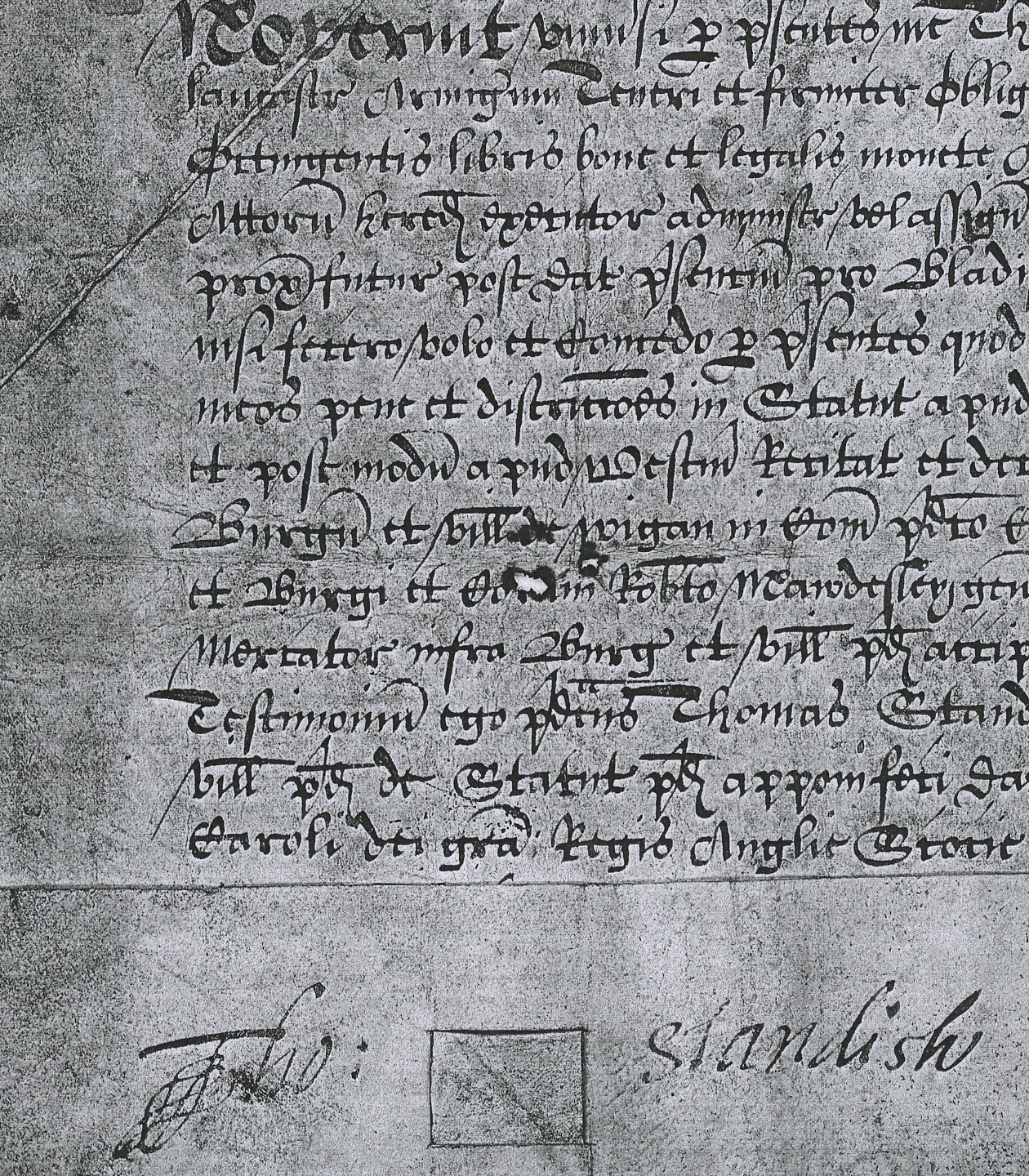

1640 - 1647. Love - Marriage - Civil War - Death - the end of a Dynasty.
Lancashire Record Office DP 397/21/15 1640/41.
22nd January 1640. (The old Calendar - the year 1640 ends in March and the New Year 1641 begins)
Marriage contract between Thomas Standish gent son and heir of Thomas Standish Esquire Lord of the Manor of Duxbury and Elizabeth Vaux of the parish of St Martin's in the fields in the County of Middlesex.
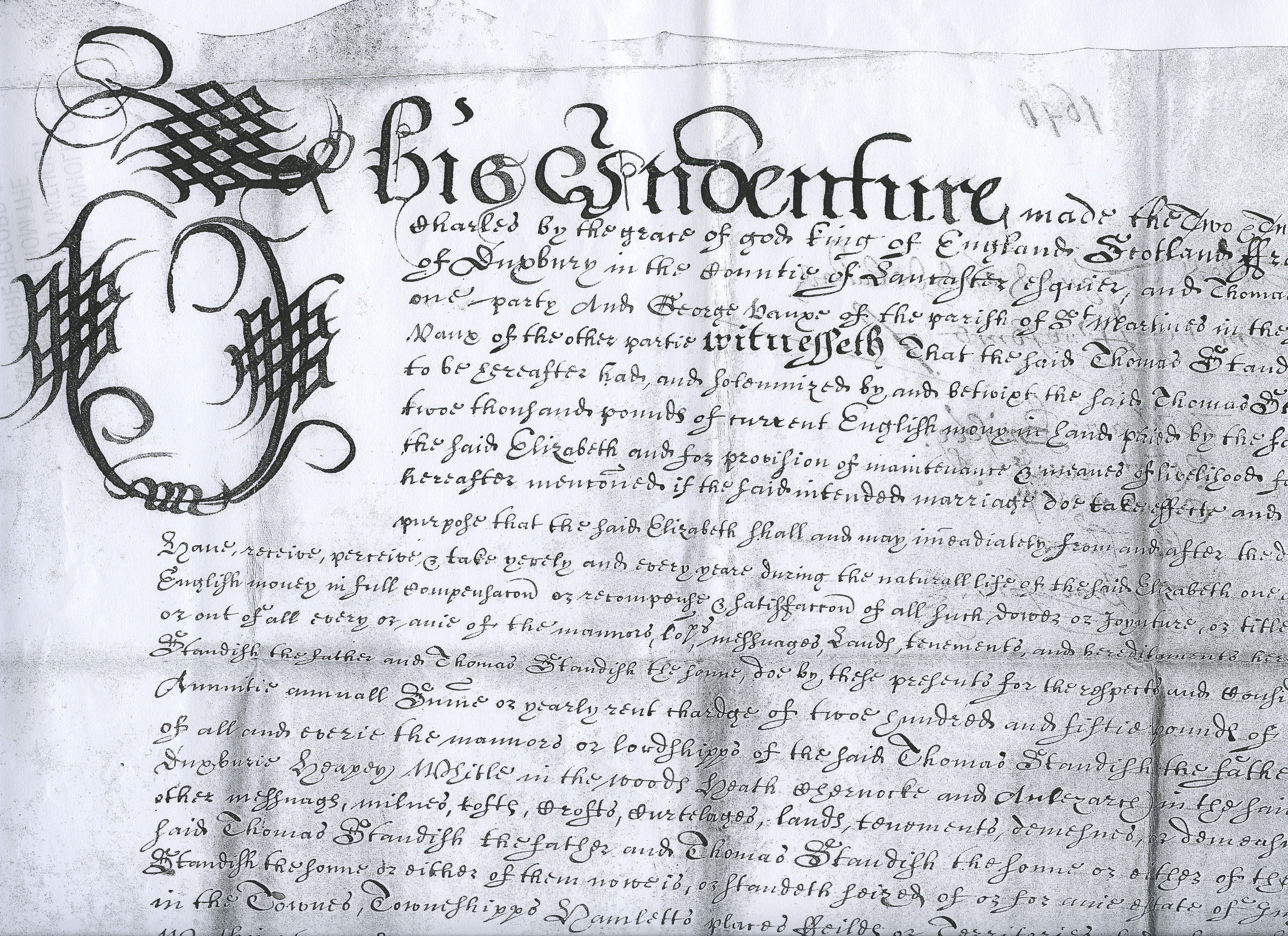
DP 397/21/15 1640/41. A transcription of the Indenture.
This Indenture made the Two and Twentith day of January in the sixteenth yeare of the raigne of our Soveraigne lord Charles, by
the grace of God, King of England, Scotland, France and Ireland, defender of
the faith etc,
Betweene Thomas Standish of Duxbury in the Countie of
Lancaster, esquier, and Thomas Standish
gent, sonne and heire apparent of the said Thomas Standish, esquier, of the one
party,
And George
Vauxe of the parish of St Martines in the feildes in the County of Middlesex, esquier, and
Elizabeth Vaux, daughter of the said George Vaux of the other partie,
Witnesseth
That the said
Thomas Standish, the father, and Thomas Standish, the sonne, for and in Consideration of a marriage
to be hereafter had, and solemnized by and betwixt
the said Thomas Standish the sonne and the said Elizabeth, daughter of the said
George Vaux, and of the su[m]me of
twoe thousand poundes of current English mony in hand paied by the said George Vaux to the said Thomas
Standish the father for the marriage porc[i]on
of the said Elizabeth, and for provision of maintenance and meanes of
livelihood for the said Elizabeth by way of Joynture forth and out of the
landes and hereditamentes hereafter menc[i]oned,
if the said intended marriage doe take effecte, and that the said Elizabeth doe
overlive the said Thomas Standish the sonne, and to the intente and
purpose that the said Elizabeth shall and
may, i[m]mediately from and after the death of the said Thomas Standish the
sonne (in case the said intended marriage doe take effect),
Have, receive,
perceive and take, yerely and every yeare during the naturall life of the said
Elizabeth, one Annuitie, annuall su[m]me and yearly rent-chardge of twoe
hundred and fiftie
pounds of current English money in full Compensac[i]on or recompense and satisfacc[i]on of all
such dower or Joynture or title of dower as the said Elizabeth can or may have (if the said marriage
take effect) forth or out of all, every or anie of the mannors, lo[rdshi]ps, messuages,
Landes, tenements and hereditaments herein hereafter expressed,
Have given,
granted and confirmed, and the said Thomas Standish the father and Thomas Standish the sonne
doe, by these presents, for the respects and Considerations aforesaid, give, grant, and confirms unto the
said Elizabeth Vaux, One Annuitie, annuall Su[m]me
or yearly rent chardge of twoe hundred and fiftie poundes of current English
money to be yearely issueing and
goeing forth and out of all and everie the mannors or lordshipps of the said Thomas Standish the father and Thomas
Standish the sonne, or either of them, situate and being in Duxburie, Heapey,
Whitle in the woodes, Heath Chernocke and Anlezarch in the said Countie
of Lancaster,
And forth and
out of all and every the capitall or other messuages, milnes, toftes, Crofts, Curtelages, landes, tenements, demesnes
and demesne landes, rents, reverc[i]ons, services,
and hereditamentes whatsoever of the said Thomas Standish the father and Thomas
Standish the sonne, or either of them, and whereof or wherein the said Thomas
Standish the father and Thomas
Standish the sonne, or either of them, no we is or standeth seized, of or for anie
estate of Inheritance, in possession, reverc[i]on or remaynder, or otherwise,
Situate and being in the Townes,
Towneshipps, Hamletts, places, Feildes or Territories of Duxbury, Heapey, Whitle in the woodes, Heath Chernocke,
Anlezarch, Standish, Langtree, Worthington and Chorley, and in every or anie of them, or eiswhere in the County of
Lancaster,
To have and to
hould the said Annuitie, annuall
su[m]me, or yearly rent charge of twoe hundred and fiftie poundes, to the said
Elizabeth and her assignes, from and i[m]mediately after the decease of the
said Thomas Standish the so[n]ne, for and during the terrne of the naturall
life of the said Elizabeth, The same
annuitie an[n]uall su[m]me or yearely rent charge of twoe hundred and fiftie poundes
to be and continewe payable, yerely and every yeare, to the said Elizabeth and
her assignes, during her naturall life, at
and upon the Feastes of the birth of our Lord God, co[m]monly called
Christmas, and the feast of the nativitie of St John the Baptist, co[m]monly
called Midsomer day, by even and equall porc[i]ons,
The first paym[en]t thereof to begin
at such of the said Feastes as shall first and next happen after the death of
the said Thomas Standish the so[n]ne,
And the same yearly payement to be
made and paied accordingly at or in the middle Temple Hall in London,
And if it shall happen the said a[n]nuity,
a[n]nuall su[m]me or yerely rent charge of two
hundred and fiftie poundes, or any pfarjte thereof, to be behind and unpaied,
in part or in all, at either of the said Feastes, during the naturall life of
the said Elizabeth,
That then and
in such Case, and soe often as the same a[n]nuity, a[n]nuall su[m]me or yerely rent charge of two
hundred and fiftie poundes or any part thereof shall happen to be soe behind and unpaid,
It shall and may be lawefull to and
for the said Eliz[a]beth and her assignes, into and upon all and singular the
said mannors or lordshipps, messuages, lands, tenem[en]tes, hereditamentes and premisses, w[i]th the
appurtena[u]nces, or into any part or parcell thereof. To enter and distraine, Aswell [for] the said
A[n]nuity, a[n]nuall su[m]me or yerely rent charge of twoe hundred and fiftie poundes and the arrerages thereof (if
anie shall happen to be) as alsoe for the su[m]me of twentie shillings pferj diem [per day] to be [forfeited nomine pene [in the name of a penalty] for every day after
either of the said Feastes that the said a[n]nuity, a[n]nuall su[m]me or yearly rent
charge of twoe hundred and fifty poundes or any part thereof, shall happen to be soe behind and [unp]aied,
And the distresse and distresses
there had, found or taken, to lead, drive, take, carrie away, impound, detayne
and keepe w[i]th the said Elizabeth or her assignes untill the said annuity, annuall su[m]me or [ye]rely rent charge
of twoe hundred and fiftie poundes, and the arrerages thereof, if any be, and
all and every su[m]me and su[m]mes of money forfeited and lost nomine pene for non payem[en]t of the
same a[n]nuity, a[n]nuall su[m]me or ye[rely] rent charge of two hundred and
fifty poundes, or any p[ar]t thereof, shalbe truely satisfied and paid to the said Elizabeth or her assignes,
And
it is the agreement
of all the said pafrties] to these presents, And the said Thomas Standisshe the father and
Thomas Standish the sonne doe hereby alsoe Covenant, grant, promise and agree, to and
w[i]th the said George Vaux [an]d Elizabeth Vaux, their Executors and Administrators,
That they, the said Thomas Standish
the Father and Thomas Standish the so[n]ne, or the one of them, nowe have or hath good power [and] authorise to charge
all and singular the said mannors or lo[rdshi]pps, landes, tenem[en]tes,
hereditaments and premisses in a manner as is aforesaid, discharged of
Incumbrances done by them, the said Thomas Stan[dis]h the father and Thomas Standish the so[n]ne, or either
of them, their or either of their heires or assignes,
(The title of
dower of Anne, nowe wife of the said Thomas Standish the father, and all leases [for] three lives
or fewer, or for any number of yeres determinable upon the death of one, twoe or three lives, alreadie made by the
said Thomas Standish the father, of tenements usually
lett to farme at and [u]nder the therefore usuall and accustomed rentes and
services alwayes excepted), And
further that all and singular the said ma[n]nors or lordshipps, landes,
tenementes, demesnes or demesne
landes and premisses, w[i]th the app[urtenances] (except before excepted) shall
at all tymes hereafter remayne and be overt and sufficient to and for the distresse and distresses of the said Elizabeth
Vaux and her assignes, as well for the said a[n]nuity, a[n]nuall su[m]me or yerely rent chardge of twoe hundred and
fifrie poundes, and the arrerages thereof (if any be), as alsoe for all and
every the su[m]me or su[m]es of money forfeited and lost nomine pene upon such default as aforesaid.
In w[i]tnes
whereof the parties abovesaid have hereunto interchangeably set their handes and Seales the day and yeare above
written :1640:
Alas the intervention of the
English Civil War ended the marriage contract and Thomas Standish and his
beloved Elizabeth Vaux would not become man and wife as was intended on
the 22nd day of January in the Winter of 1640 .
Royalists and Parliamentarians the Civil War.
Chorley, like many other places in England, found its
leading families taking opposite sides in the great struggle between the
Royalists and the Puritans. Whilst Richard Chorley of Chorley Hall, Robert Charnock of Astley, Alexander Rigby of Burgh, Anderton of Euxton, and Ralph Standish of Standish, were
loyal to their King, Thomas Standish of Duxbury, M.P. for Preston, and Edward
Robinson of Buckshaw, were on the side of the Parliament. However the eldest son,
the namesake, and heir of Thomas Standish was a Captain in the King's army - a Captain
of a trained band of Men of the Leyland Hundred. He was killed at the siege of
Manchester, in a most peculiar manner. He was quartered in a house on the north
side of Salford " well up towards the Chapel" —i.e., Manchester
Collegiate Church, (now the Cathedral) and while washing his hands at the
door on the morning of September 29, 1642, he was killed by a bullet shot
from the top of the church steeple (sniper). He was brought home to Duxbury for burial. This is the
entry in the Register of the Church of St. Laurence: " Dux. Thomas Standish de Duxbury sessederit apud
Manchester et sepultus fuit apud Chorley 30mo Septembris."
1642. The sad event appears to have accelerated the father's death, for the very
next entry save one reads: " Thomas Standish de Duxbury Arf [Armi-gero]
Sepul fuit 29 Octoberis." 1642.His second son Alexander and successor was in the
Parliamentary army, for we find further on: "Alexrus Coll
[Colonel] Standish de Duxbury sepultus fuit 15t0Marcij
[1646-7].

15th June 1647 A.D.
Document Lancashire Archives DP 397/21/16.
Margaret Standish widow of Alexander Standish (the youngest surviving son of Thomas Standish - deceased 15th March 1646) transfers her Dower by legal contract (all of the Duxbury Estates including other lands and property formerly owned by the Standish family of Duxbury the Lords of the Manor of Duxbury) to a distant Standish cousin.
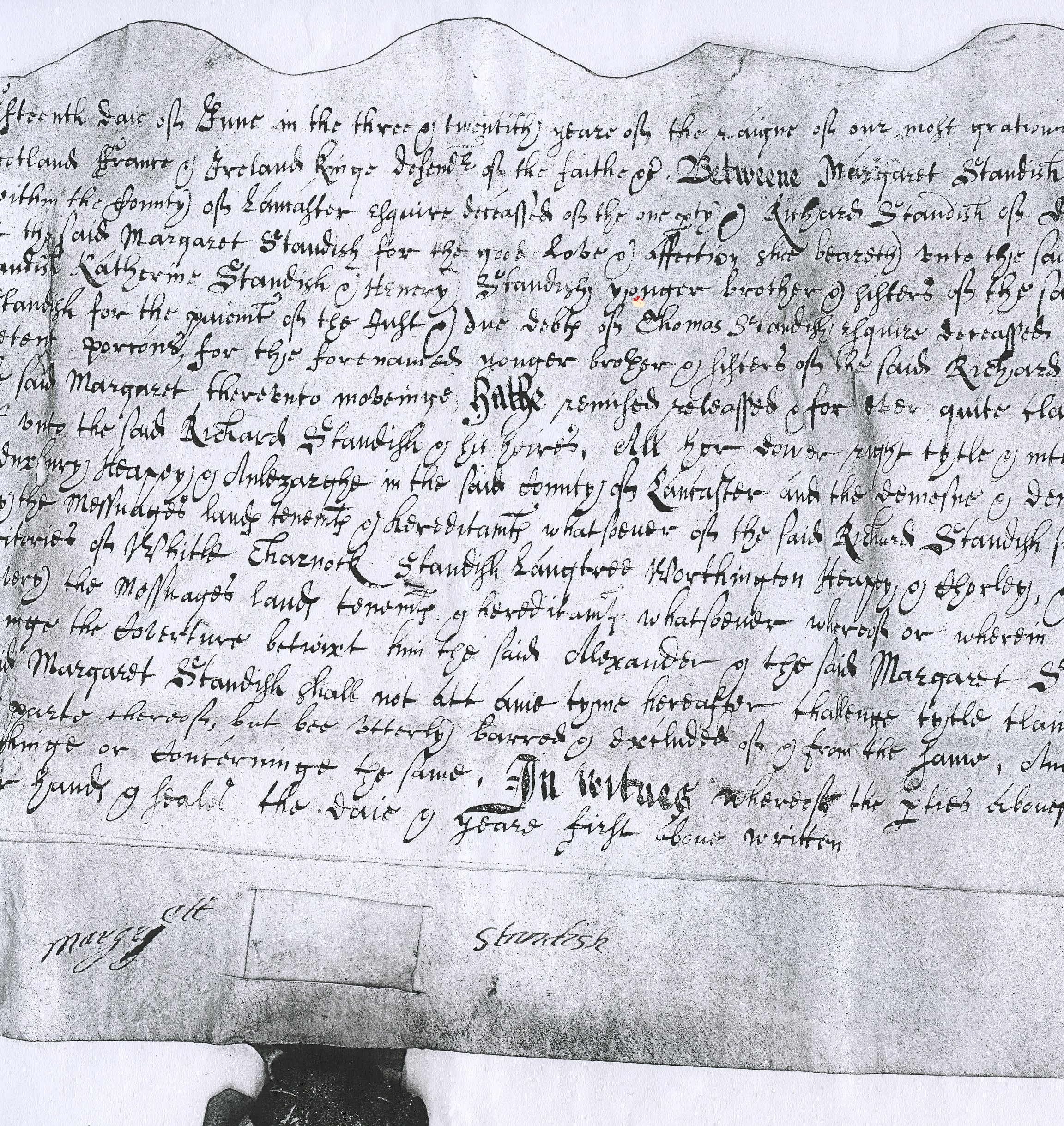

Types of Pele Tower.
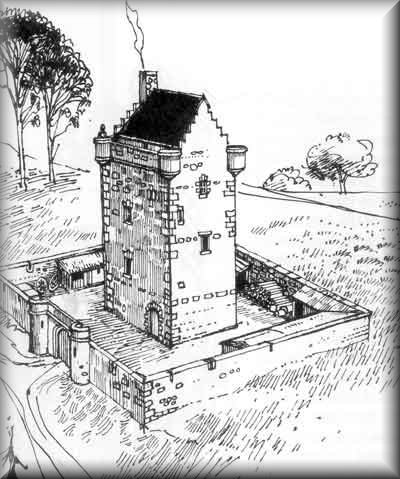
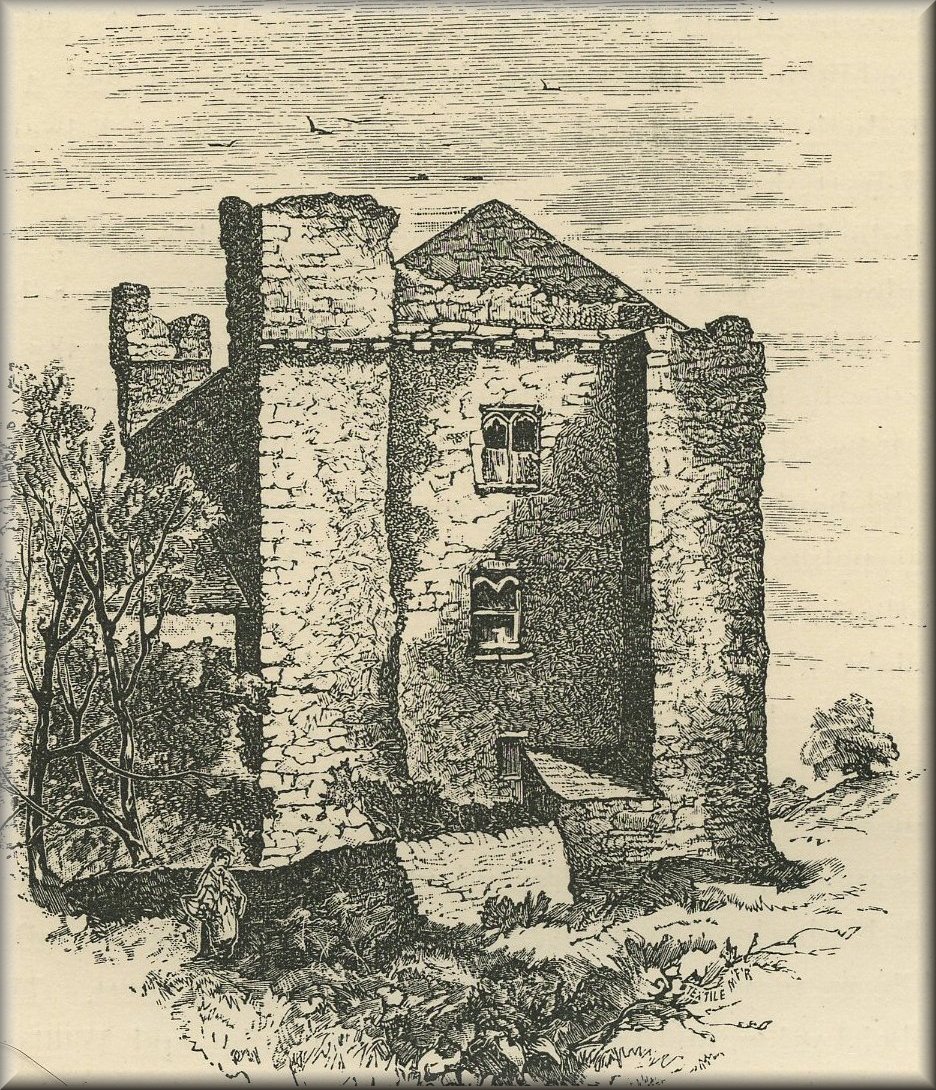
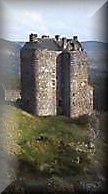
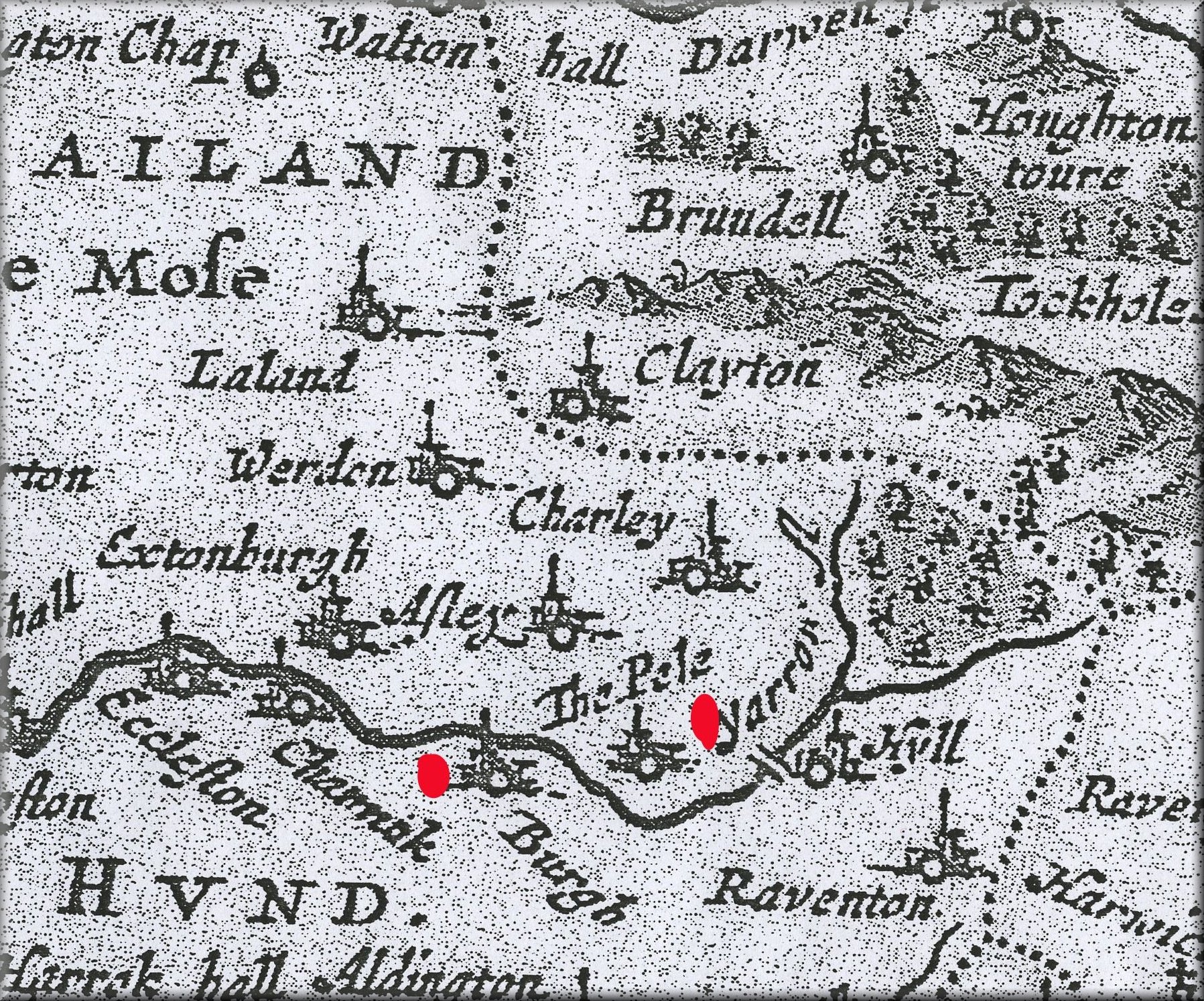
John Blaeu 1645. (The Pele Tower to the West of the river the Burgh to the East of the river)

![]() xc
xc 
![]()

![]()
 Arms changed from to -
Arms changed from to - 
![]()
 DEED.jpg)

![]()

![]()

![]()

![]()

![]()




![]()